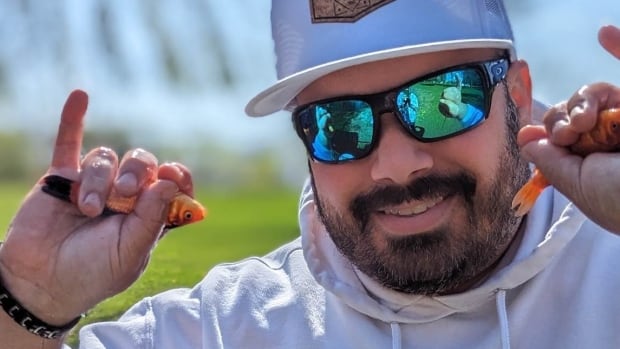When a neighbour told Curt Beleutz of Sparta, Ont., last month that goldfish had taken over a natural wetland in a wooded area near his home, he grabbed a pool net and a bucket and started pulling them out.
“We basically just walked through the shallow water and scooped up as many as we could,” he said. “That day, I think we had around 80.”
Every time he went back, there seemed to be more, said Beleutz, 41. “Realistically, there’s thousands.”
Beleutz spends at lot of his free time now setting traps, collecting the small fish and releasing them into his backyard pond, which is not connected to any other natural waterways. He also gives them to people looking to stock their own ponds.
Curt Beleutz has been catching invasive goldfish in a Sparta, Ont., waterway and releasing them into an isolated pond.
In the long run, he’s not likely to make much of a dent, Beleutz admitted. But he hopes he might be able to reduce the goldfish population for at least this season. Plus — and maybe more importantly — he’s telling everyone who will listen not to let unwanted goldfish out into the wild.
They predate on the eggs of native fish species and that does quite a number on the population.– Curt Beleutz
Exploding goldfish populations that can successfully survive the winter are wreaking havoc on native fish species across the country, in suburban storm water ponds, in lakes and other waterways. Researchers in B.C. recently warned the invasive fish is moving in schools the size of football fields and spreading from Vancouver to other parts of B.C.
“They can reach sexual maturity within a year so each female lays 1,000 eggs per season,” said Beleutz “They predate on the eggs of native fish species and that does quite a number on the population.”
Beleutz’s interest in goldfish is longstanding. For about 10 years, he bred a Japanese-variety goldfish that can’t survive Canadian winters and sold them to pet stores.

‘Don’t let it loose’
“I commend the person for taking action there and raising awareness and discussion around it.,” said Colin Cassin, policy manager at the Invasive Species Centre.
However, it’s hard to know if all of Beleutz’s effort is making much of difference, he said.
“Hitting reset on that kind of an ecosystem can be difficult and and require some very costly interventions,” said Cassin. “Sometimes it regrettably turns into a herbicide management situation, some sort of fish-killing chemical done under stringent regulations and a pretty significant process at play that has provincial and federal regulation considered, too.”
What’s the better scenario? Prevention, said Cassin.

“My key message is don’t let it loose,” he said. “Our opportunity is to prevent the introduction from Day One and that’s where the cost effective moment can be.”
And that’s the real reason Beleutz keeps going down to the wetland, he said.
“I bring my neighbours’ kids with me and I’m really just trying to instill in them the fact that they don’t belong there and we should educate other people,” said Beleutz.
“They’re the next generation that’s going to have to deal with this problem.”


